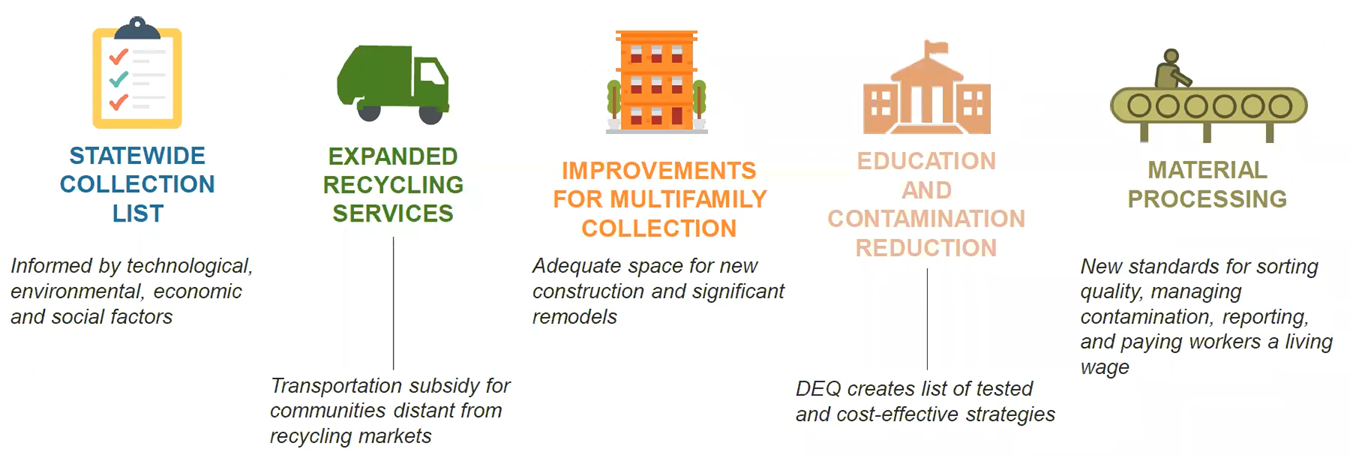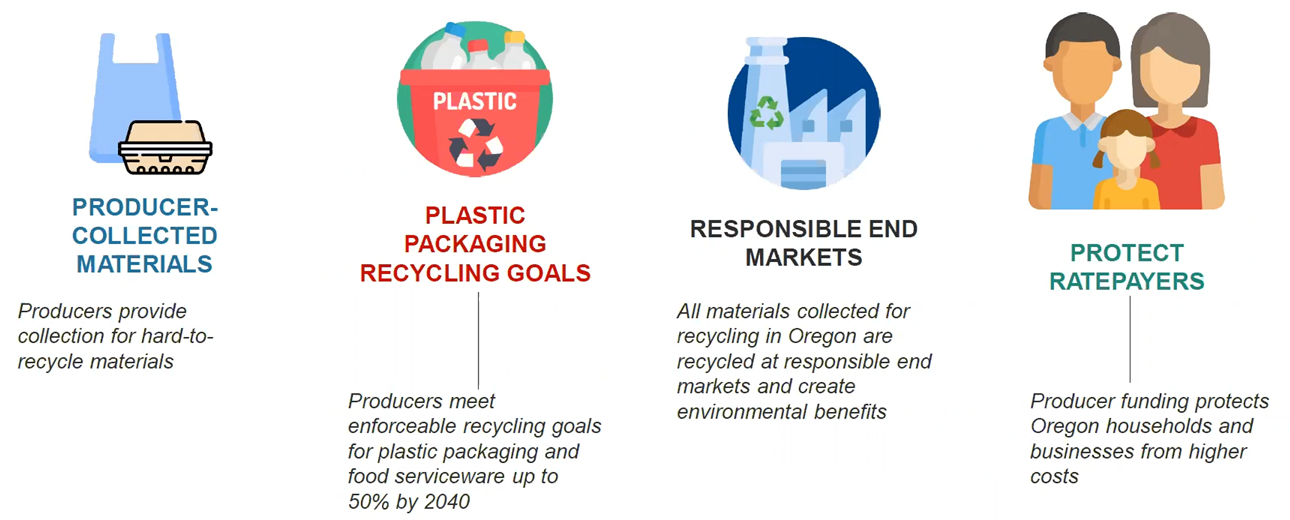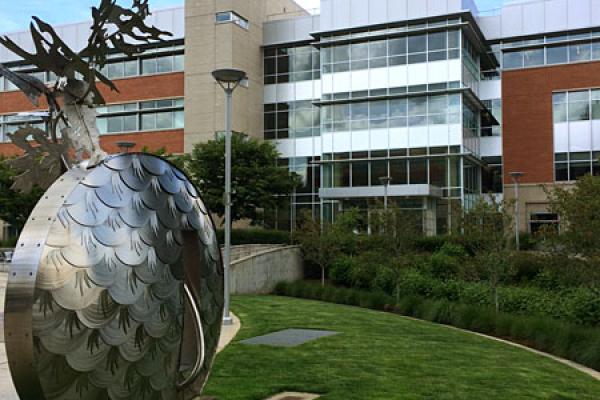A modern makeover for Oregon’s recycling system
The Plastic Pollution and Recycling Modernization Act (RMA) will update Oregon’s outdated recycling system by building on local community programs and leveraging the resources of producers to create an innovative system that works for everyone. The Oregon legislature passed the Recycling Modernization Act (Senate Bill 582) during the 2021 legislative session. The new law became effective Jan. 1, 2022 and recycling program changes will start in July 2025.
What is RMA?
Oregon’s Plastic Pollution and Recycling Modernization Act (RMA) is a statewide law created to make recycling more efficient, environmentally responsible, and consistent across all Oregon communities. It also encourages smarter packaging design to reduce waste. Many initial improvements will take place behind the scenes, like upgrading recycling facilities, creating better tracking systems to renew public confidence in the system, and eventually leading to all communities in Oregon having the opportunity to recycle the same items from the convenience of their home and work.
Starting July 1, 2025, Oregon’s recycling system will begin its largest upgrade in decades. Consumers will no longer bear the full burden of recycling; brands, like Amazon and Proctor & Gamble, will be held financially accountable for the environmental impacts of their packaging, paper, and food serviceware products in the state which will allow for investments in our recycling infrastructure. While some changes will start right away, others may not take effect until 2027 or later.
Summary of RMA Elements:
- System Expansion – All Oregonians will be able to recycle at home and work.
- Statewide Collection List – What Oregonians can recycle at home and work will be the same across the state.
- Recycling Facility Investment – Modernization of our recycling sorting facilities.
- Responsible End Markets – Ensure all items accepted for recycling have responsible end markets locally, domestically, and abroad.
- Contamination Reduction – Invest in education and outreach to minimize the amount of trash that gets placed in recycle bins.
- Recycling Centers – Drop-off locations for additional items like Styrofoam™, propane canisters, shredded paper, large plastic buckets, and more. (Timelines vary by material and location.)

Brands will work with the state’s approved producer responsibility organization (PRO), Circular Action Alliance (CAA) to implement the approved program plan facilitating the rollout of RMA. They will manage the statewide efforts and provide general recycling information on their statewide webpage www.RecycleOn.org/Oregon. For those areas of the state with robust recycling (like Clackamas, Multnomah, and Washington Counties), much will remain the same, including our local recycling, glass, yard debris, and garbage webpages, guides, and information.
ClackCo Impacts
Unlike some parts of Oregon, Clackamas County residents are already able to recycle at home and work. For the most part, what we can recycle is not changing. However, the changes taking place are expected to lead to additional items being added to our recycling list in the years to come. To keep our recycling system strong, it’s important we place only acceptable materials in our recycling bins. Review the recycle guide (available in seven languages online) to be reminded of what items belong in which bin. When we all do our part to reduce, reuse, and then recycle right, we help reduce the energy needed to make new products, conserve natural resources, prevent pollution, and create jobs.
Here is a list of the minor changes to take place in Clackamas County beginning July 1, 2025:
- Additions to the list of acceptable items for recycling:
- Plastic caps OK if screwed on to plastic bottles, jars, and jugs (loose caps are garbage)
- Pizza boxes with grease (only – no food)
- Shredded paper will no longer be accepted curbside (recycling centers will eventually be set up to accept shredded paper).
- Changes to specifics:
- Plastic bottles, jugs, and round plastic containers will need to be 2 inches by 2 inches or larger (instead of the previous 6 ounce minimum).
- Scrap metal cannot exceed 10 lbs. nor 18 inches (instead of the previous limits of 30 lbs. and 30 inches).
Changes that Clackamas County residents will see in the coming years:
- Expanded recycling options on Mt. Hood (details/timing: TBD)
- Recycling centers and/or events for additional items that aren’t accepted in the recycle bin (locations/timing: TBD)
- Expanded efforts to ensure only accepted materials are placed in the recycle bin
- Additional items added to the recycle list over time
Other EPR Programs in Oregon
Like RMA, other extended producer responsibility (ERP) programs exist in Oregon. With EPR, similar to RMA, producers are responsible for the entire lifecycle of their products, especially at the end of their useful life (collection, recycling, disposal). Other EPR programs in the state include:
- BottleDrop – deposit cans and bottles (Oregon beverage containers)
- Paint Care – paints and stains
- Oregon E-Cycles – TVs, computers, laptops, printers, and more
- Bye Bye Mattress – mattresses and box springs
 Translate
Translate








